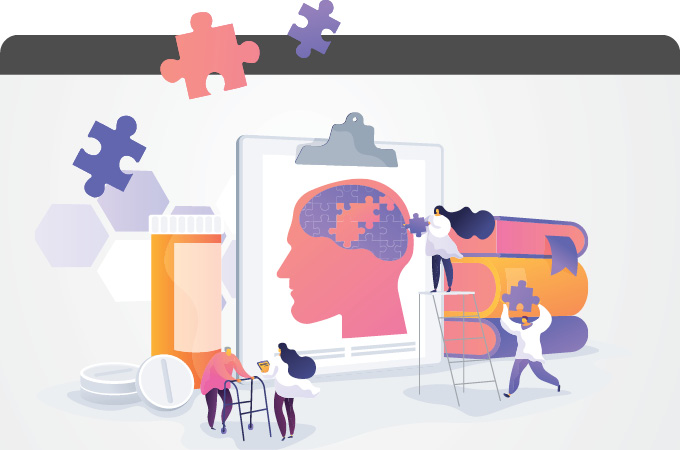An Alzheimer’s disease or dementia diagnosis is unlike other medical conditions. Its impact reaches far beyond a single individual. For patients’ friends and family, it often marks the beginning of a long, difficult journey, during which they watch their loved one change, and the condition’s genetic components can be a source of anxiety and uncertainty. Families and caregivers struggling can turn to organizations like the Alzheimer’s Association and Alzheimer’s Foundation of America for resources and support.
talking with kids
Alzheimer’s has a major impact on the entire family, and that includes the youngest members. It’s important to be open and honest when discussing the disease and its impacts with kids and teens.
- Be open and answer questions. Talking honestly is the best way to help children manage the changes that come with a loved one receiving an Alzheimer’s diagnosis. Answer questions directly and use simple, age-appropriate language. Children may be curious about the disease, so help them learn by sharing information.
- Acknowledge their feelings. Children can have a variety of reactions to the news. They may be sad, frustrated, confused, embarrassed, curious or worried. If they live with a family member with dementia, they may feel jealousy due to the extra attention given to that person. Let them know what they’re feeling is normal and valid. Set aside time for them to share their emotions and be prepared to offer comfort and ways to work through their feelings.
- Prepare them for changes. Alzheimer’s is a condition that worsens over time. Let children know that even if their loved one looks healthy on the outside, they are still sick on the inside. Explain what changes can be expected and the impact it may have on your family. If you’ll be taking on a caretaking role, explain to your kids why you may have less time to spend with them.
- Make time to connect. Alzheimer’s doesn’t mean children can no longer connect with diagnosed loved ones. Still make sure you set aside time for them to talk or do a simple activity together. Even with social distancing, teens and kids can connect with older family members. Over a video call, they can read together, listen to music or even try a simple craft.
reduce your own risk
Researchers still are making new discoveries about the causes of Alzheimer’s. While some known factors, such as genetics, cannot be altered, studies have shown that lifestyle changes can improve people’s outcomes. Along with regular medical checkups and memory screenings, here are some adjustments that can help you reduce your risk.
- Physical exercise: Increasing blood and oxygen flow in the brain with exercise may lower your risk of Alzheimer’s and other dementias. Plus, with known cardiovascular benefits, regular physical activity should already be an important part of your wellness plan.
- Intellectual exercise: Studies have shown that keeping mentally engaged may prevent cognitive decline. Challenge your brain with puzzles, or shake up your normal routine by trying something different, such as learning a new language, picking up a sport like golf or tennis, or taking a cooking class.
- Diet: Foods considered heart healthy are also brain healthy. Fill your diet with fresh, colorful fruits and vegetables and whole grains. Reduce how much red meat, processed sugar and saturated fats you consume. Also limit smoking and alcohol consumption.
- Socializing: Along with boosting your mood, social interaction is important for brain health. Don’t let the pandemic stop you from engaging with friends and family. Host a game night over Zoom, schedule regular calls or find socially distanced ways to meet in person.
know the signs
The Alzheimer’s Association lists 10 important warning signs for the disease and other dementias. If you notice any of these in yourself or a loved one, schedule an appointment with a physician.
- Memory loss that disrupts everyday life
- Challenges planning or problem-solving
- Difficulty completing familiar tasks
- Confusion with time or place
- Trouble understanding visual images and spatial relationships
- New problems with words in speaking or writing
- Misplacing things and losing the ability to retrace steps
- Decreased or poor judgment
- Withdrawal from work or social activities
- Changes in mood and personality
Sources: Alzheimer’s Association, Alzheimer’s Foundation of America, National Institute on Aging








